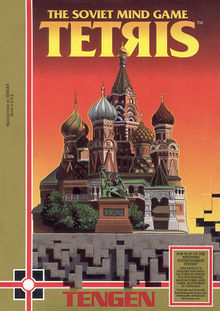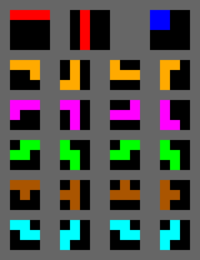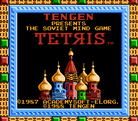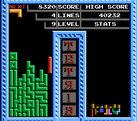Tetris (NES, Tengen): Difference between revisions
*>Tepples Explain rotation rules |
No edit summary |
||
| (33 intermediate revisions by 11 users not shown) | |||
| Line 1: | Line 1: | ||
{{Infobox |title = | {{Infobox |title = Tetris | ||
|developer = Tengen | |developer = Tengen | ||
|publisher = Tengen | |publisher = Tengen | ||
|released = | |released = 17 May 1989 | ||
|platform = NES | |platform = NES | ||
|boxart = | |boxart = Tetris_(Tengen)_boxart.jpg | ||
|title-scrn = | |title-scrn = Tetris (Tengen) title.png | ||
|ingame-scrn = | |ingame-scrn = Tetris (Tengen) ingame.png | ||
|hard= | |hard = No | ||
| | |system = Atari | ||
|preview = 1 | |||
|hold = No | |||
|playfield=10 × 20 (regular), 12 × 20 (co-op) | |||
}} | }} | ||
The game gives line clearing bonuses only after completing each | '''''Tetris''''', stylized as '''''TETЯIS: The Soviet Mind Game''''', is a tetromino game for NES published by Tengen, the home video game division of Atari Games. Much of the gameplay mechanics and the graphical style were lifted from [[Tetris (Atari)|the arcade ''Tetris'' by Atari Games]]. | ||
This cartridge is rare because it was recalled after Andromeda Software, which at the time was [[Elorg]]'s Western agent for the Tetris brand, lost the game console rights. As a result, the Tengen game was only on the shelf for four weeks before Atari was legally required to recall the game, and the remaining 268,000 cartridges were recalled and destroyed during that time (see [[History]]). | |||
== Modes == | |||
*1-player: Standard endless mode. | |||
*2-player: Simultaneous endless mode, aim to outlast the other player. Both players receive the same sequence of pieces. | |||
*Cooperative: Co-operate to clear lines on a common playfield. As in 2-player, both players will get the same sequence of pieces. | |||
*Versus Computer: 2-player with a CPU player. | |||
*With Computer: Cooperative with a CPU player. | |||
== Levels == | |||
Initially levels advance every 30 lines. After clearing 5 levels they will occur every 50 lines instead (i.e. 200, 250, 300, etc.). The maximum level is 17. | |||
In cooperative mode levels will advance when either player reaches the appropriate threshold. | |||
{| class="wikitable" | |||
!Level | |||
!Frames per row | |||
|- | |||
|0||33 | |||
|- | |||
|1||28 | |||
|- | |||
|2||24 | |||
|- | |||
|3||20 | |||
|- | |||
|4||17 | |||
|- | |||
|5||14 | |||
|- | |||
|6||11 | |||
|- | |||
|7||9 | |||
|- | |||
|8||7 | |||
|- | |||
|9||6 | |||
|- | |||
|10||5.5 | |||
|- | |||
|11||5 | |||
|- | |||
|12||4.5 | |||
|- | |||
|13||4 | |||
|- | |||
|14||3.75 | |||
|- | |||
|15||3.5 | |||
|- | |||
|16||3.25 | |||
|- | |||
|17||3 | |||
|} | |||
== Scoring == | |||
The score for each [[tetromino]] that the player places is <math>\min(d \times r \times (r + h), 999)</math>, where | |||
*''d'' = 1 for normal gravity or 2 for soft [[drop]] when the tetromino lands | |||
*''r'' = the level number plus 1 | |||
*''h'' = the row on which the tetromino was placed, minus 1 (0 = bottom) | |||
The game gives line clearing bonuses only after completing each level (or after every 50 lines at level 17). These are scored as follows: | |||
{| class="wikitable" | |||
!Line clear | |||
!Score | |||
|- | |||
|Single||100 | |||
|- | |||
|Double||400 | |||
|- | |||
|Triple||900 | |||
|- | |||
|Tetris||2500 | |||
|} | |||
In cooperative mode both players receive the line clearing bonuses. | |||
== Rotation rules == | == Rotation rules == | ||
[[Image:Tengen-pieces.png|200px]] | [[Image:Tengen-pieces.png|thumb|200px|right]] | ||
The game uses the same rotation system as the Atari Games arcade version. Pieces spawn with the left side of their bounding box at column 5 and top at row 22. All rotation states align the piece at the top left corner of the piece's bounding box, except for I's vertical state which is placed in the second column from the left. | |||
Because basic rotation can fail when a piece is against the right wall, but not when the same piece is against the left wall, this game will wallkick one square to the left if basic rotation fails. If that fails the piece will not rotate. This allows for a few very unique wallkicks. | |||
All tetrominoes become the same color when they lock, due to limitations of the NES picture memory. The color the pieces change to varies from level to level. | |||
<br clear="all"/> | |||
== External links == | == External links == | ||
*[http://www.classicgaming.com/rotw/ttetris.shtml Classic Gamings Tengen Tetris Page] | *[http://web.archive.org/web/20061214024051/http://www.classicgaming.com/rotw/ttetris.shtml Classic Gamings Tengen Tetris Page] | ||
*[http://www.blockstats.org/games/NES_Tengen.html Blockstats Tengen Tetris Page] | *[http://www.blockstats.org/games/NES_Tengen.html Blockstats Tengen Tetris Page] | ||
*[http://www.thevgatv.com/resources/NES/NES-Tengen-Tetris.pdf Manual] | |||
[[Category:Official Tetris games]] | |||
[[Category:Games with cooperative mode]] | |||
[[Category:Nintendo Entertainment System games]] | |||
Latest revision as of 00:59, 26 April 2022
| Tetris | |
|---|---|
 | |
| Developer(s) | Tengen |
| Publisher(s) | Tengen |
| Platform(s) | NES |
| Release | 17 May 1989 |
| Gameplay info | |
| Next pieces | 1 |
| Playfield size | 10 × 20 (regular), 12 × 20 (co-op) |
| Hold piece | No |
| Hard drop | No |
| Rotation system | Atari |
Tetris, stylized as TETЯIS: The Soviet Mind Game, is a tetromino game for NES published by Tengen, the home video game division of Atari Games. Much of the gameplay mechanics and the graphical style were lifted from the arcade Tetris by Atari Games.
This cartridge is rare because it was recalled after Andromeda Software, which at the time was Elorg's Western agent for the Tetris brand, lost the game console rights. As a result, the Tengen game was only on the shelf for four weeks before Atari was legally required to recall the game, and the remaining 268,000 cartridges were recalled and destroyed during that time (see History).
Modes
- 1-player: Standard endless mode.
- 2-player: Simultaneous endless mode, aim to outlast the other player. Both players receive the same sequence of pieces.
- Cooperative: Co-operate to clear lines on a common playfield. As in 2-player, both players will get the same sequence of pieces.
- Versus Computer: 2-player with a CPU player.
- With Computer: Cooperative with a CPU player.
Levels
Initially levels advance every 30 lines. After clearing 5 levels they will occur every 50 lines instead (i.e. 200, 250, 300, etc.). The maximum level is 17.
In cooperative mode levels will advance when either player reaches the appropriate threshold.
| Level | Frames per row |
|---|---|
| 0 | 33 |
| 1 | 28 |
| 2 | 24 |
| 3 | 20 |
| 4 | 17 |
| 5 | 14 |
| 6 | 11 |
| 7 | 9 |
| 8 | 7 |
| 9 | 6 |
| 10 | 5.5 |
| 11 | 5 |
| 12 | 4.5 |
| 13 | 4 |
| 14 | 3.75 |
| 15 | 3.5 |
| 16 | 3.25 |
| 17 | 3 |
Scoring
The score for each tetromino that the player places is , where
- d = 1 for normal gravity or 2 for soft drop when the tetromino lands
- r = the level number plus 1
- h = the row on which the tetromino was placed, minus 1 (0 = bottom)
The game gives line clearing bonuses only after completing each level (or after every 50 lines at level 17). These are scored as follows:
| Line clear | Score |
|---|---|
| Single | 100 |
| Double | 400 |
| Triple | 900 |
| Tetris | 2500 |
In cooperative mode both players receive the line clearing bonuses.
Rotation rules

The game uses the same rotation system as the Atari Games arcade version. Pieces spawn with the left side of their bounding box at column 5 and top at row 22. All rotation states align the piece at the top left corner of the piece's bounding box, except for I's vertical state which is placed in the second column from the left.
Because basic rotation can fail when a piece is against the right wall, but not when the same piece is against the left wall, this game will wallkick one square to the left if basic rotation fails. If that fails the piece will not rotate. This allows for a few very unique wallkicks.
All tetrominoes become the same color when they lock, due to limitations of the NES picture memory. The color the pieces change to varies from level to level.


